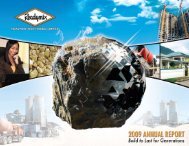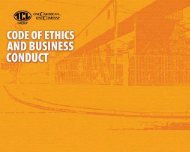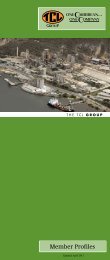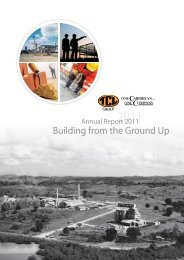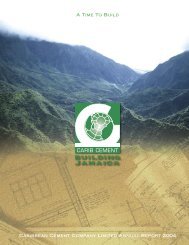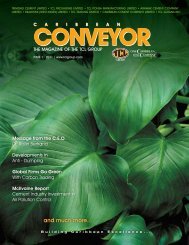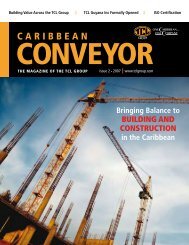2006 - Eastern Caribbean Securities Exchange
2006 - Eastern Caribbean Securities Exchange
2006 - Eastern Caribbean Securities Exchange
Create successful ePaper yourself
Turn your PDF publications into a flip-book with our unique Google optimized e-Paper software.
Group Chief Executive Officer’s Report and Management Discussion1.0 Health, Safety and the Environment (HSE)Group Chief Executive OfficerDr. Rollin BertrandThe Group’s HSE record improved in <strong>2006</strong> as theimportance of safety and health continued to beentrenched across the Group. During the year, allsubsidiaries focused on training in Occupational Safetyand Health and the 4th Group HSE Forum was held inTrinidad during November <strong>2006</strong> to discuss contractorsafety management, risk assessment and root causeanalyses. The Group continues to review its systemsand procedures and has implemented a programmeto further instill a “Culture of Safety”. There were nofatalities in <strong>2006</strong>.During the year, all subsidiaries focused on mechanismsto continually improve environmental conditions andminimise impacts with particular attention to emissionreduction by the cement plants. To this end, the Groupestablished a milestone in <strong>2006</strong>, as all three cementcompanies completed final audits for ISO 14001:2004certification. By year end, both Arawak and TCLachieved certification and <strong>Caribbean</strong> Cement acquiredits certification in early 2007. RML’s process is in placefor a certification audit during 2007.2.0 Financial Review and AnalysisNet ProfitNet Profit Attributable to Group Shareholdersamounted to $145.7m compared with $160.3m lastyear, the decline due to the absence of tax creditsrecorded in the prior year. Earnings per Share (EPS) is60 cents compared with 66 cents for 2005.RevenueThe TCL Group, in <strong>2006</strong>, achieved a notable increase of20% or $289.2m to $1.719 billion in revenue over theprior year. This growth was largely driven by buoyantdemand and price adjustments implemented in thedomestic markets of Trinidad and Tobago and Jamaicaas well as the company’s export markets. These priceincreases became necessary to offset higher energy24



